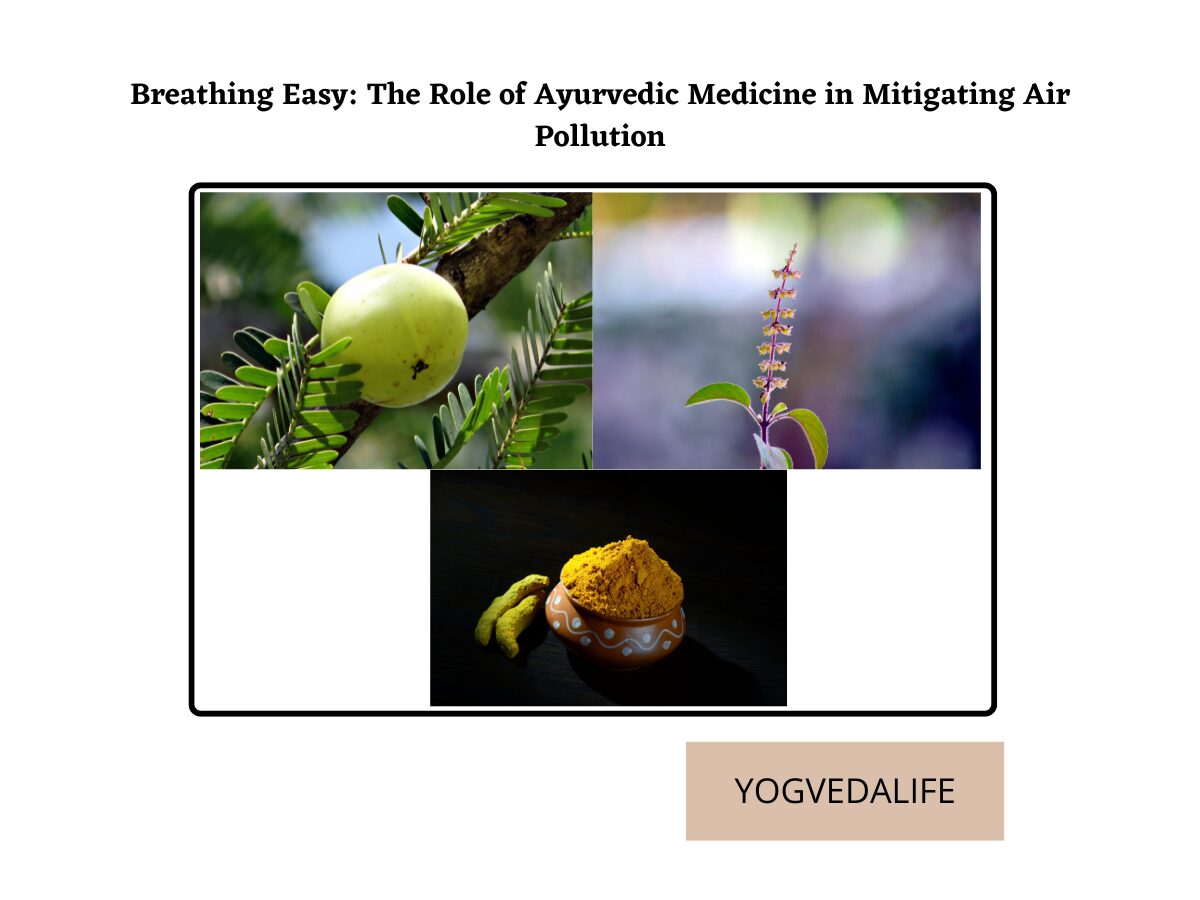The quality of air depletion has been a topic of mouth for a decade now. Still, the situation has become alarming in a few years.2024 was a year of all the global warming effects around the world, and India has been dealing with air pollution leading to AQI OF AROUND 600 TO 300 in most states, which is harmful to every living being in every possible way! Hence, we will learn about Breathing Easy and The Role of Ayurvedic Medicine in Mitigating Air Pollution.
WHAT IS AIR POLLUTION:

Air pollution is a growing global concern that affects not only human health but also the environment. The increasing levels of pollutants in the air have severe consequences, ranging from respiratory problems to climate change.
Causes of Air Pollution:
- Industrial emissions: Factories, power plants, and vehicles release harmful gases, such as carbon monoxide, nitrogen oxides, and particulate matter.
- Vehicular emissions: Cars, trucks, and other vehicles emit pollutants, including carbon monoxide, hydrocarbons, and nitrogen oxides.
- Agricultural activities: Farming practices like burning crops and using pesticides contribute to air pollution.
- Domestic activities: Household activities, like cooking and heating, release pollutants.
Effects of Air Pollution:

- Respiratory problems: Air pollution exacerbates asthma, bronchitis, and lung cancer.
- Cardiovascular diseases: Exposure to pollutants increases the risk of heart attacks, strokes, and other cardiovascular diseases.
- Neurological damage: Air pollution affects cognitive function, memory, and neurological development.
- Environmental degradation: Air pollution contributes to climate change, acid rain, and ecosystem damage.
Solutions to Air Pollution:

- Renewable energy: Transition to solar, wind, and hydroelectric power to reduce fossil fuel dependence.
- Emission controls: Implement stricter regulations on industrial and vehicular emissions.
- Energy efficiency: Promote energy-efficient technologies and practices.
- Sustainable transportation: Encourage electric or hybrid vehicles, cycling, and walking.
- Waste management: Implement effective systems to reduce waste burning.
- Public awareness: Educate individuals about air pollution’s risks and promote behavioral change.
HERBS TO KEEP OUR RESPIRATORY SYSTEM STRONG-
YOU CAN CONSUME THE FOLLOWING HERBS IN THE FORM OF WHOLE, TEA, CAPSULES, OR AS STEAM –

- Vasa – Adhatoda vasica
- Pushkaramula – Inula racemosa
- Kantakari – Solanum xanthocarpum
- Pippali – Long pepper / Piper longum
- Maricha – Black pepper
- Shunti – Ginger
- Chitraka – Plumbago zeylanica
- Dashamula – 10 roots
- Twak – Cinnamon
- Haritaki – Terminalia chebula
- Draksha – Raisins
- Musta – Cyperus rotundus
- Katuki – Picorrhiza kurroa
- Haridra – Turmeric
- Daruharidra – Berberis aristata
- Rasna – Alpinia galangal
- Ela – cardamom
- Vacha – Acorus calamus
- Kulattha – horse gram
- Jeeraka – Cumin seeds
- Amalaki – Emblica Officinalis
- Loha – Iron
- Guduchi – Tinospora cordifolia
- Tulsi -Holy basil
BENEFIT-
- Supports Healthy Liver Function: Amla’s antioxidants and other compounds may help protect the liver from damage, supporting healthy liver function and detoxification.
- Relieves bronchitis and asthma: expectorant properties help loosen and clear mucus from the airways.
- Soothes coughs: anti-inflammatory properties help reduce throat inflammation and alleviate coughs.
- Supports lung health: antioxidant properties help protect the lungs from damage and promote healthy lung function.
- Supports the immune system: immunomodulatory properties help boost the immune system and prevent respiratory infections.
Conclusion:
- As the world grapples with the challenges of air pollution, we must explore alternative approaches to preventing and managing air pollution-related health issues. Ayurvedic medicine, emphasis on natural remedies and holistic wellness, offers a promising solution. By integrating Ayurvedic medicine with modern medicine and adopting lifestyle changes that incorporate Ayurvedic principles, we can mitigate the effects of air pollution and create a healthier future for generations to come. Further research is needed to fully explore the potential of Ayurvedic medicine in addressing air pollution-related health issues, but the existing evidence suggests that this traditional system of medicine has much to offer. Remember, “PRECAUTION is better than CURE.”
ALSO- https://yogvedalife.com/understanding-coronary-heart-disease-causes-symptoms-and-treatment/


[…] ALSO- https://yogvedalife.com/breathing-easy-the-role-of-ayurvedic-medicine-in-mitigating-air-pollution/ […]